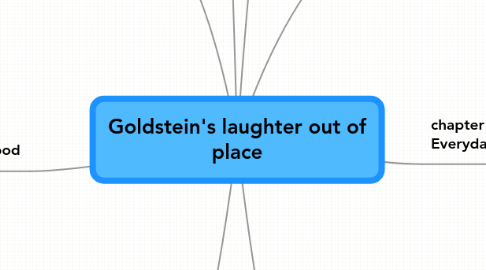
1. introduction- Hard Laughter
1.1. destigushes teh difference between shantytowns which are piulated by people living poor or in poverty , these people are similar caught up in the system and have no real control
1.2. humor a major theme
1.3. laughter seems ubiquitous, and a way to deal with the harsh realities of their predicament.
1.4. Outline the main historical events that have defined the political and economic landscape of brazil
2. chapter 2, the Aesthetics of Domination
2.1. wages are too low for workers to live on
2.1.1. being this type of worker identifies them as in a lower working class
2.2. to be out of this class would be middle class, that is having the ability to pay someone eelse to do ones manual labor
2.3. schools are not very good, making it difficult for students and children to make it out of the lowest class
2.4. a perceived change in the classes would be when gloria was able to eat the same food that she also cooked
2.5. laughing out of place was still used as a way of distancing oneself from society
2.5.1. this laughter sustains families nad seperates classes leading to furthur cultural distinctions
3. chapter 4 No Time for Childhood
3.1. woman's sexual choice
3.1.1. If a woman chooses to have sex, she needs to be preparened
3.1.2. consequences from Pablo could be devastating, as he will kill a woman who chooses an abortion
3.2. the Good Life
3.2.1. material luxuries for the elite further stratify the people
3.2.2. These discrepancies lead to larger and larger gaps between classes
3.2.2.1. This makes laughter even more necessary, to cope with the taunting of elites
3.3. criminal life= brutal
3.3.1. trying to avoid a life a crime is essential
3.3.1.1. a lot of problems stem from crime and it is very hard to get out of
3.3.2. social mobility almost doesn't exist
3.4. childhood
3.4.1. privileged vs unprivileged
3.4.1.1. where one, and to what family one is born is essential to living a good life vs. a life of poverty, crime, and disease
4. chapter 6 Partial Truths or the Carnivalization of Desire
4.1. sexuality and poverty
4.1.1. desire and transgression and masculin ideas
4.1.2. social life and sexuality and closely linked meaning that sexuality is a metaphor to Cariocas
4.2. Carnivalization of Desire
4.2.1. male homosexuality has upper and lower class models that are oth active and passive
4.2.2. brazilian feminists
4.2.2.1. again finding voice through humor "laughter out of place"
4.2.3. flirtation in public
4.2.3.1. often complementary of womens bodies
4.3. Felicidade Eterna gender/sexual culture
4.3.1. comer has two meanings one of them being sexual but both referring to eating and used as a verb or noun
4.3.2. women seen as passive and giving
4.3.3. this comer; defines people as whether you are a person who eats, or one who is eaten
4.4. partial truths
4.4.1. poor women are left to guard against a societal issue of transgressive male sexuality
4.4.2. women have no power to protest male infidelity or govern male sexuality of transgression
5. chapter 1 Laughter "Out of Place"
5.1. travels to Brazil and familiarizes with local culture
5.2. attends undergraduate school and studies US relations with latin america
5.3. Humor as hidden transcript and weapon of the week
5.3.1. seemingly in bad taste however, power was the goal
5.4. Avoiding presenting a culture of poverty
5.4.1. Research methods interview hides identities
5.5. Hegemony ruling opper class
5.6. Goldstein uncomfortable with contradicitons in celebration
5.7. Need to upturn the social order
5.8. Slave trade sugar coffee, monarchy Portugal lack of land reform resulted in class divides
6. chapter 3 Color Blind Erotic Democracies
6.1. where someone lives such as a favela marks ones class
6.2. european mean began mixing faces in the 1800s
6.2.1. prostitution, sexual acts of slaves, rapes, were all represntations of black bodies
6.3. race vs class, north americans more likely to talk about race, while south americans more comfortable talking about class separation
6.4. coroas older richer white men who were in change
6.4.1. this sexuilization lead to
6.4.1.1. mens attractiveness being based on economic well being (class, money)
6.4.1.2. women's attractiveness based solely on appearence
7. chapter 5 State Terror, gangs and Everyday violence in Rio De Janeiro
7.1. drugs
7.1.1. seen as both a danger to lower class, and a luxury to the middle class
7.2. Crime prevention
7.2.1. an illusion of collusion
7.2.1.1. cops act like the middle class plays no role, however they are instrumental in crime and drugs.
7.3. violence
7.3.1. more prevalent in poorer communities,
7.3.1.1. Thus furthur enabling the crime and drugs to continue through the middle class while blaming the poor
7.4. gang life
7.4.1. the only means of social mobility
7.5. outsiders are not welcome and "dirty" the community with perspective and knowledge
8. chapter 7 What's So Funny About Rape
8.1. laws and rape
8.1.1. general distrust and fear of police
8.1.1.1. rapes go often unreported
8.1.2. anachronistic legal codes
8.1.2.1. differences between poor/rich in court Class system
8.1.2.1.1. adjudication difficult
8.1.3. only solution is laughter, women often don't have power especially in this instance
8.1.3.1. rape of a child however is cause for murder in shantytowns
8.2. evening of terror
8.2.1. marila failed at murdering her husband
8.2.1.1. unfaithful
8.2.2. laughter/rape
8.2.3. gloria's family was assulted
8.2.3.1. downplayed like always with humor
8.3. conclusion
8.3.1. most people have no solutions to their problems, and laughter remains to be the solution
8.3.2. deepening layers add context to womens struggle
8.3.3. women are not inherently passive or submissive, male domination and transgression lead to the limiting and constricting of every aspect of their lives.
8.4. Mothers vs Daughters
8.4.1. when daughters lose virginity they must move out
8.4.2. daughters need to demand economic support from their husbands
8.4.3. suffering can be highlighted through narration
